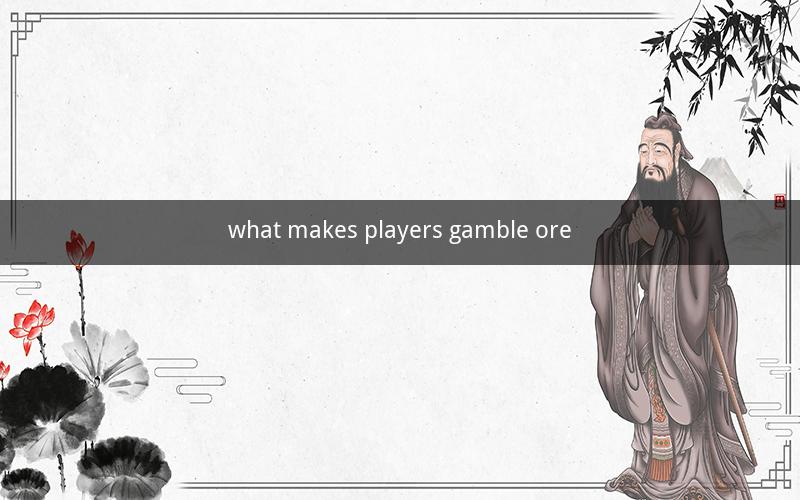
Directory
1. Introduction to Gambling
2. Factors Influencing Gamblers
3. Psychological Factors
4. Social Factors
5. Economic Factors
6. Technological Advancements
7. The Role of Advertising
8. The Impact of Legalization
9. Conclusion
10. Frequently Asked Questions
1. Introduction to Gambling
Gambling has been a part of human culture for centuries. It involves betting money or something of value on an event with an uncertain outcome. Players engage in gambling for various reasons, and understanding what makes them gamble more can help us comprehend the complexities of this behavior.
2. Factors Influencing Gamblers
Several factors contribute to the likelihood of players gambling more. These factors can be psychological, social, economic, or technological.
3. Psychological Factors
Psychological factors play a significant role in the gambling behavior of individuals. Here are some key psychological factors that influence players to gamble more:
- Thrill-Seeking: Many players are drawn to gambling due to the thrill and excitement it offers.
- Mental Health: Individuals with certain mental health issues, such as depression or anxiety, may be more prone to gambling.
- Addiction: Problem gamblers often experience an addiction to gambling, leading them to engage in it more frequently.
- Lack of Control: Some players may feel a sense of loss of control in their lives, leading them to seek it through gambling.
4. Social Factors
Social factors also contribute to the likelihood of players gambling more. These factors include:
- Peer Influence: Friends and family members who gamble may encourage others to do the same.
- Cultural Norms: In some cultures, gambling is seen as a normal and acceptable activity.
- Social Events: Certain social events, such as weddings or birthdays, may involve gambling activities.
5. Economic Factors
Economic factors can significantly influence a player's gambling behavior. These factors include:
- Financial Stress: Individuals facing financial difficulties may turn to gambling as a way to cope with their problems.
- Income Levels: Players with higher incomes may be more likely to engage in gambling due to their disposable income.
- Promotions and Bonuses: Casinos and online gambling platforms often offer promotions and bonuses that entice players to gamble more.
6. Technological Advancements
Technological advancements have made gambling more accessible and convenient, contributing to players gambling more. These advancements include:
- Online Gambling: The rise of online gambling platforms has made it easier for players to access gambling opportunities.
- Mobile Gambling: Players can now gamble on their smartphones and tablets, increasing the convenience of gambling.
- Virtual Reality: The use of virtual reality technology in gambling has made the experience more immersive and appealing to players.
7. The Role of Advertising
Advertising plays a significant role in influencing players to gamble more. Here are some key aspects of advertising that contribute to this:
- Targeted Advertising: Advertisers often target specific demographics, such as young adults or individuals with higher incomes, to increase the likelihood of them engaging in gambling.
- Emotional Appeal: Advertisements often use emotional appeal to entice players to gamble.
- Promotions: Advertisements may promote promotions and bonuses that encourage players to gamble more.
8. Conclusion
Understanding what makes players gamble more can help us address the issue of problem gambling and promote responsible gambling behavior. By addressing the psychological, social, economic, and technological factors that contribute to excessive gambling, we can work towards creating a healthier and more balanced approach to gambling.
Frequently Asked Questions
1. What is the most common psychological factor that leads to excessive gambling?
- The most common psychological factor is thrill-seeking, as many players are drawn to the excitement and adrenaline rush that gambling provides.
2. How can social factors influence a person's gambling behavior?
- Social factors, such as peer influence and cultural norms, can encourage individuals to engage in gambling activities and increase their likelihood of gambling more.
3. What economic factors contribute to players gambling more?
- Economic factors, such as financial stress and income levels, can lead individuals to seek relief or entertainment through gambling.
4. How have technological advancements affected gambling behavior?
- Technological advancements, such as online and mobile gambling, have made gambling more accessible and convenient, leading to an increase in gambling behavior.
5. What role does advertising play in influencing players to gamble more?
- Advertising can target specific demographics, use emotional appeal, and promote promotions and bonuses, all of which can entice players to gamble more.
6. How can problem gambling be addressed?
- Problem gambling can be addressed through counseling, support groups, and educational programs that promote responsible gambling behavior.
7. What are some signs of problem gambling?
- Signs of problem gambling include hiding gambling activities, borrowing money to gamble, feeling restless or irritable when not gambling, and prioritizing gambling over other responsibilities.
8. How can individuals develop a healthier approach to gambling?
- Individuals can develop a healthier approach to gambling by setting limits, seeking support, and understanding the risks associated with gambling.
9. What is the impact of legalization on gambling behavior?
- Legalization can lead to an increase in gambling opportunities, which may result in more players engaging in gambling activities.
10. How can parents help prevent their children from developing a gambling addiction?
- Parents can help prevent their children from developing a gambling addiction by setting a positive example, discussing the risks of gambling, and monitoring their children's online activities.